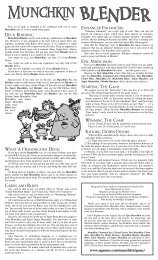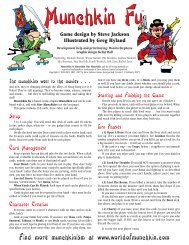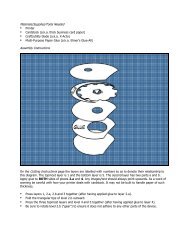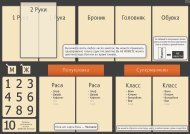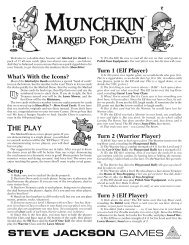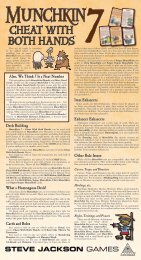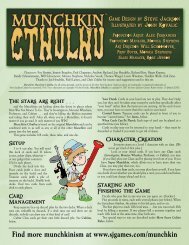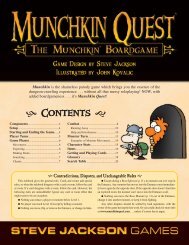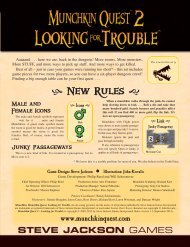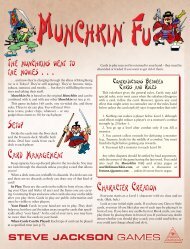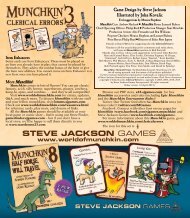MBooty-Rulesheet.qxd:Rulesheet template.qxd - Munchkin
MBooty-Rulesheet.qxd:Rulesheet template.qxd - Munchkin
MBooty-Rulesheet.qxd:Rulesheet template.qxd - Munchkin
Create successful ePaper yourself
Turn your PDF publications into a flip-book with our unique Google optimized e-Paper software.
Ships<br />
Dear to a seafaring munchkin’s heart (as of now) is his sturdy Ship.<br />
Because, of course, it gives bonuses. Ships are found in the Door deck.<br />
Normally, no player can have more than one Ship. Cheat cards and<br />
special powers can allow extra ships.<br />
Ships are Items, and follow normal Item rules. Anything that affects an<br />
Item can affect a Ship.<br />
Ships carry themselves. A Ship is “Big,” but it does not count against<br />
the number of Big items you can carry (in fact, some let you carry extra Big<br />
things). The “Big” designation on Ships is to control what Traps and<br />
Curses affect them, and to keep Thieves in a blender game from pocketing<br />
them and walking off.<br />
There are also a few Items that specifically enhance Ships. Ships can<br />
also be enhanced by regular “Item Enhancers” from other sets, if those<br />
Enhancers otherwise apply. Enhancers cannot be moved between Ships. A<br />
Ship with an Enhancer has the Enhancer’s gold value added to its own.<br />
If a Ship gives a bonus or penalty to Run Away, that specifically<br />
replaces any bonus that its owner gets from Footgear, Steeds (in a blender<br />
game), or other possessions. If your Ship gives you a penalty to Run Away,<br />
you may discard the Ship before you roll to flee. You don’t suffer the penalty,<br />
but the Ship goes to the discard pile.<br />
And . . . if you have more than one Ship, you get all their combat<br />
bonuses and the best Run Away bonus. You may ignore any penalty from<br />
one ship that the other doesn’t also give you, because, being a munchkin,<br />
you are always on the best ship at any particular moment.<br />
Other <strong>Munchkin</strong> Stuff<br />
There will be times when it will help you to play a Curse or<br />
Wandering Monster on yourself, or to “help” another player in a way that<br />
costs him treasure. This is very munchkinly. Do it.<br />
Trading<br />
You may trade Items (but not other cards) with other players. You may<br />
only trade items from the table – not from your hand. You may trade at<br />
any time except when you’re in combat – in fact, the best time<br />
to trade is when it’s not your turn. Any item you receive in<br />
trade must go to the table; you can’t sell it until it’s your turn.<br />
You may also give items away without a trade, to bribe<br />
other players – “I’ll give you my Thigh Boots if you won’t help<br />
Bob fight the Jellyfish!”.<br />
You may show your hand to others. Like we could stop<br />
you.<br />
Interfering With Combat<br />
You can interfere with others’ combats in several ways:<br />
Use a one-shot card. If you have a card like Grog, you could<br />
help someone by throwing it against his foe. Of course, you can<br />
“accidentally” hit your friend with the card, and it will count<br />
against him.<br />
Play a card to enhance a monster. See Monster Enhancers, above.<br />
You can play these either during your own combats or during someone<br />
else’s combat.<br />
Play a wandering monster. This sends a monster from your hand to<br />
join any combat.<br />
Curse them, if you have a Curse card.<br />
“Shark” Monsters<br />
The ocean is full of sharks . . . and when one appears there are more<br />
nearby. Whenever any Shark is in a combat, any player may play any other<br />
Shark from his hand to join it. Some Sharks don’t have “Shark” in the<br />
monster name, but they all have a “Shark” tag above the monster name.<br />
Rules Contradictions or Disputes<br />
When the cards disagree with the rules, follow the cards. Any other<br />
disputes should be settled by loud arguments among the players, with the<br />
owner of the game having the last word.<br />
Designer’s Note<br />
I have wanted to do a pirate <strong>Munchkin</strong> game for years, but I always<br />
stumbled on the fact that – while historically there were several different<br />
sorts of pirates and privateers – they weren’t different enough to give me<br />
funny Classes. My thanks to Brian Hogue for suggesting that Pirate should<br />
be one Class, leaving entirely different types of seafarers as the other<br />
Classes. After that breakthrough, the rest of this game fell into place, arrrr.<br />
Monica Stephens is responsible for the excellently silly idea that the pirates<br />
should not have “nationalities” as such, but should talk in Accents instead.<br />
The faithful <strong>Munchkin</strong> player will note that the dungeon paradigm<br />
COMPLETELY breaks down in this genre. We are sailing the seven seas in<br />
search of plunder, yet at the same time we are “opening doors” and “looting<br />
rooms.” Yarrrr! We be munchkins an’ we don’t CARE!<br />
Crossover Notes<br />
If you combine this set with <strong>Munchkin</strong> Impossible, Accents are NOT<br />
the same as Loyalties. You can be loyal to the British and have a British<br />
accent, but you can also be loyal to the Russians and have a French accent.<br />
Or whatever. Historically, the days of the pirates were crawling with spies,<br />
but don’t let the realism keep you from doing it.<br />
Combining This Game With<br />
Other <strong>Munchkin</strong> Sets<br />
Go for it! Your half-Elf, half-Mutant Russian Pirate Assassin, speaking<br />
with a French accent, can strike fear into the hearts of foes from the deepest<br />
dungeons to the depths of space. All at once.<br />
Shuffle all the Treasure cards together. Shuffle all the Door cards<br />
together. You now have two big decks. If you have enough sets, you now<br />
have two VERY big decks.<br />
Use the “faster play” rules (see box). Note that these rules<br />
refer to some card types that are not in this particular set!<br />
Don’t panic.<br />
Traps and Curses are treated as the same kind of<br />
card. Any reference to a Trap also means a Curse<br />
and vice versa. Yes, Star <strong>Munchkin</strong> Gadgeteers can<br />
“disarm” Curses. Likewise, Credits and Gold Pieces are the<br />
same thing and can be combined to buy levels, pay taxes, and so on.<br />
All characters may have Races, Classes, <strong>Munchkin</strong> Fu Styles,<br />
<strong>Munchkin</strong> Impossible Loyalties and Training, and <strong>Munchkin</strong> Booty<br />
Accents! All at once!<br />
Hirelings, Sidekicks, and <strong>Munchkin</strong> Fu Mooks are all the same<br />
“Hireling” class, and the Mook can sacrifice himself like a<br />
Sidekick/Hireling, but each Hireling can carry items or be enhanced only<br />
as that card says.<br />
Faster Play<br />
For a quicker game, each player starts with four cards from each<br />
deck, and gets four from each deck when he returns from death.<br />
Any time an Accent, Class, Super <strong>Munchkin</strong>, or Bilingual card<br />
is on top of the discard pile, any player may discard a Go Up A Level<br />
card from his hand and claim it. If multiple players try to claim a card,<br />
they roll dice. The winner gets it; the loser keeps his Level card.



